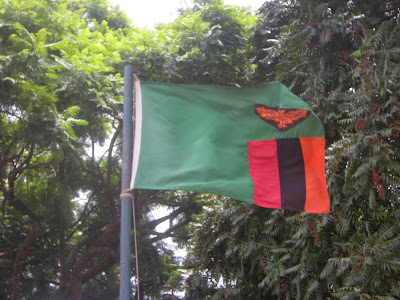 |
| The Dynamic Stars Academy lads watching the ball, wherever it goes |
 |
| The pitch |
The Dynamic Stars are the first academy that I got to know and worked with in Lusaka and I hope that this partnership will continue develop. What appealed to me was the ideas and aspirations the organisation have for the future and the way that they use football to allow the children and young adults a chance to live more healthily and avoid some of the specific dangers inherent in the environment, communities and society in which they exist.
One of the first tasks I undertook on my return to the UK from Zambia after my first visit was to translate and edit the academies governing document and produce this, with the help of some friends, into an accessible leaflet form including some photographs I had taken whilst out there. This was then shipped over to Lusaka to be distributed in the city. The text below is taken from the leaflet and illustrates, in the academies own words, the work they do, the motivation for it and the aspirations and objectives they have as a organisation for the, hopefully near, future.
About the Academy
We are a sporting academy, formed in May 2012, and named the Dynamic Stars Academy by a committee of ten local responsible adults. The academy is based in the Chainda compound of Lusaka and currently train and play on the football pitch in the Avondale area. We provide a safe environment with experienced coaches and responsible adult supervision for local children and young people from all backgrounds to participate in organised football activities. Many of the children, with little else to occupy them, find themselves missing school and becoming involved in anti-social and self-harmful behaviour.
The Dynamic Stars Academy is committed towards helping children fulfill their potential by attending school and expressing themselves positively through sport outside of school hours.
The committee discussed and agreed that football was an ideal activity to unite children and young people socially and develop their self-worth, promoting achievement through teamwork and hardwork.
Our Objectives
- To provide a safe meeting place outside school hours for boys and girls
- To educate boys and girls on the dangers of HIV and Aids by inviting relevent experts to give talks, provide information and discuss issues with them
- To encourage boys and girls to attend school and sit end of grade tests
- To educate boys and girls in the dangers of early marraige
- To make young people aware of the dangers of drug and alcohol abuse
- To give young people access to well equipped training facilities and skilled coaching, and to encourage participation in sports at all leavels of skill and different age groups
- As role models, to encourage children to adopt and develop good behaviour and discipline in all areas of their lives
- To enable children to fulfill their sporting potential at personal, local national and international levels
- To promote Christian values by teaching the word of God everyday
 |
| Warm up song and dance |
We need your help
We need your help. We have a lot of children registered for and many more interested in the football teams but as a result we have a chronic shortage of equipment and space to train. We currently share the single football pitch at Chainda playing fields, in the Avondale area, with many other groups and children from the local schools and area. We need urgent help with transport costs, financial support and to provide basic training equipment and playing kit.
We are still growing and learning as an academy but in the future we hope to have our own building and land. We are also trying to raise money for our own team minibus.
As an academy we are dedicated to the future lives of the children in our area and were not formed for our own self-interest or gain. We appeal to you as individuals or organisations to help in any way you feel you can, financially or otherwise. Whatever is given or donated will be accounted for in full because evrtything is naked in the eyes of God.
 |
| Dynamic Stars in action - friendly match |






